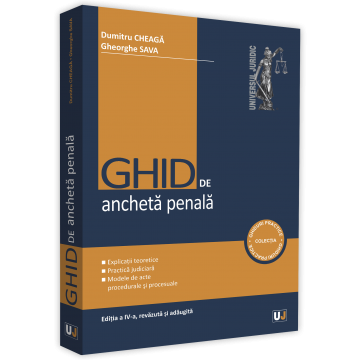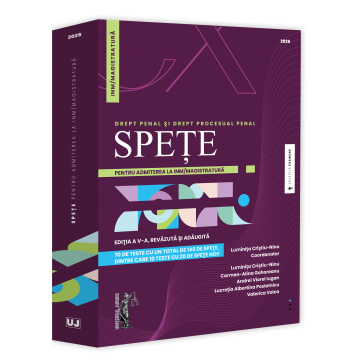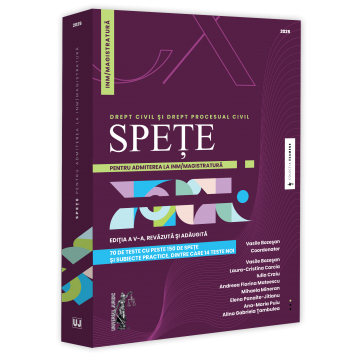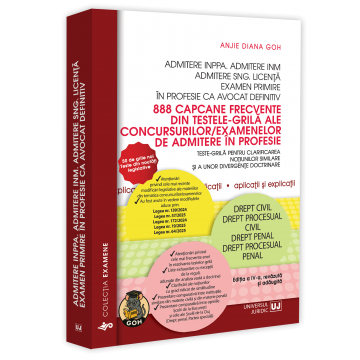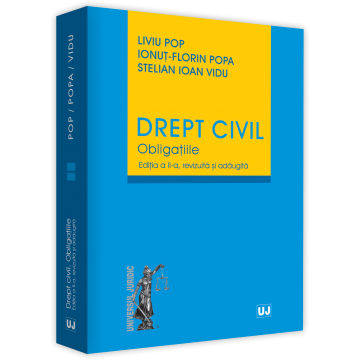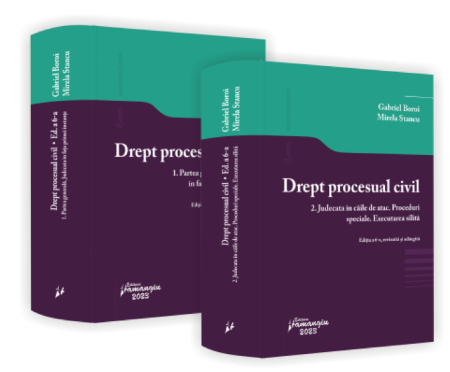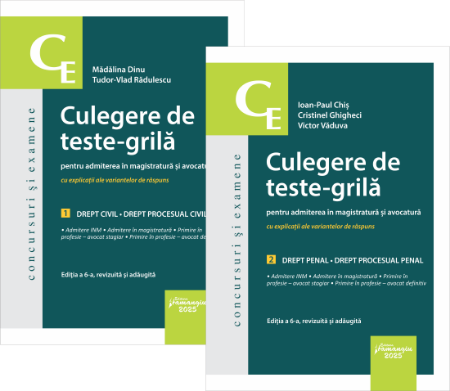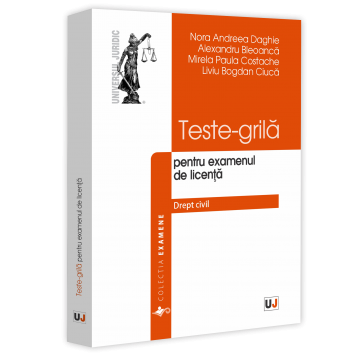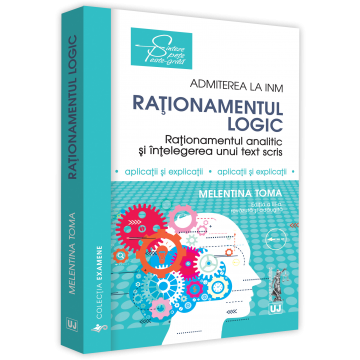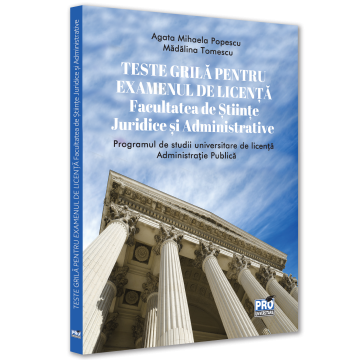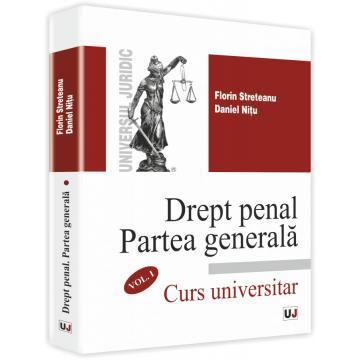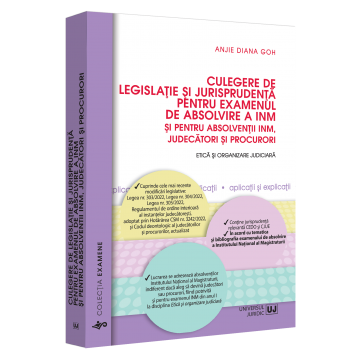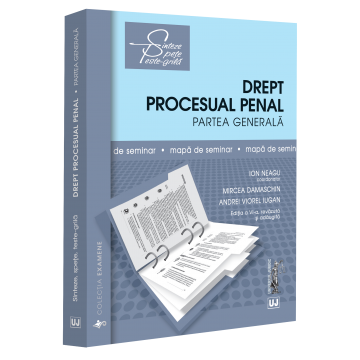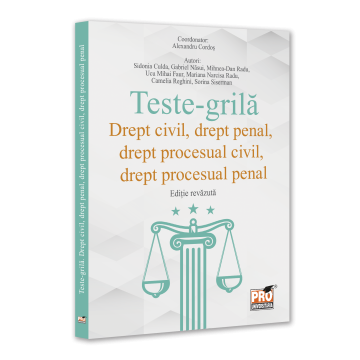Manuscript proposals: [email protected] / 0745 204 115 //// Tracking orders Individuals / Sales: 0745 200 357 / Orders Legal entities: 0721 722 783
Publisher: Editura Universitară
Author: Nicolae Pana
Edition: I
Pages: 212
Publisher year: 2023
ISBN: 978-606-28-1701-5
DOI: 10.5682/9786062817015
Product Code:
9786062817015
Do you need help?
0745 200 357
- Description
- Download (1)
- Authors
- More details
- Content
- Reviews (0)
The public consultation is largely based on the public dissemination of the content of a normative act in a certain form, usually completed, following that the issuer of the act centralizes the proposals in a strict form, previously established. In social circles, it is more important to participate in the process of drafting the substance of the act proposed later for debate in an institutionalized framework.
Therefore, the public consultation should be the first step in the elaboration of a normative act and not the final stage in which the decision-making factors have already established the substance of the act. The importance of the form is overwhelming and, as a rule, much more important than the background, which is often lost over time.
Electronic security measures are useful for protecting computer systems to some extent, but the most important measures are related to the awareness of the importance of the human factor and the security measures controlled by it. An advantage of awareness is precisely the fact that confidence in automatic technical processes increases and you can always move to another level of development, unlike cases where problems persist and any advance or transition to other levels is postponed for easy to understand reasons : the uncertainty of the system or the unpredictability of the results.
Author
Therefore, the public consultation should be the first step in the elaboration of a normative act and not the final stage in which the decision-making factors have already established the substance of the act. The importance of the form is overwhelming and, as a rule, much more important than the background, which is often lost over time.
Electronic security measures are useful for protecting computer systems to some extent, but the most important measures are related to the awareness of the importance of the human factor and the security measures controlled by it. An advantage of awareness is precisely the fact that confidence in automatic technical processes increases and you can always move to another level of development, unlike cases where problems persist and any advance or transition to other levels is postponed for easy to understand reasons : the uncertainty of the system or the unpredictability of the results.
Author
-
E-Agora. Virtual communities - legal risks and vulnerabilities
Download
"A market - Ágora - in which all citizens who must participate in the life of the city can enter" (Rousseau), this was the desire of direct democracy, considered by some philosophers to be the only political-social organization in which the citizen's rights and freedoms are respected and whose purpose is his social happiness.
Democracy and the role of the individual in society is a theme that has concerned jurists, philosophers and sociologists throughout history, in all their attempts to find the formula for the optimal combination of state power with individual and social interest.
The purpose of this paper is to analyze and compare the ancient model of direct democracy with the current socio-political context in which new technologies open up unprecedented opportunities for communication and citizen participation. The World Wide Web represents a new space, a new "market" - E‑ágora - large enough, so that any citizen of this world can participate in real time and effectively in the life of the "global" city.
Starting from the idea that new technologies can profoundly and radically influence the legislative process, in the sense of placing the individual in the foreground and moving classical political parties and organizations into the background, an attempt is made to redefine the conceived "ágora", seen as the leitmotif of the original democracy and origin. By referring to the "global village" (aldea global) and the infinity of the virtual space, it is proposed to inaugurate the virtual market of the citizens of the planet, permanently interconnected by new technologies, which simultaneously and consciously express opinions and proposals, called E‑ágora. However, in order to materialize this concept, the mechanisms and operating rules of legislative processes must be redefined.
Ágora seen as an institution of law or, more precisely, of the history of natural law, was understood as the physical place where decisions were made, as a representation of the idea of contemporary democracy. Regardless of the historical course of the concept, it summarizes the idea of participation in the legislative process, either directly or through representation.
Adding the classical concepts to the new social realities, this paper analyzes and exposes the transformations that redefine the political role of the individual in society and in the legislative process. Considering the indisputable influence of contemporary technology both on human behavior and on individual cognitive processes, we cannot ignore the possibilities it offers to citizens to reorganize the mechanisms for developing and adopting public policies. Regarding the impact of new technologies on society, as a whole, and on individuals, in particular, we cannot say that there is a unified opinion, ideas are divided into a series of parallel horizons without unanimously accepted points of congruence, which will be validated or dismantled in the future, when the effects will be clear and can be studied.
Ágora vs. E‑ágora. Just as the ancient Ágora had two functions, that of the physical market where citizens met but also a way of correlating and amalgamating public opinion in normative acts applicable erga omnes, in the same way E-ágora converges towards an idealization of public opinion that has among the purposes, that of forming opinions, creeds and, finally, legal acts.
Regarding the explanation of the proposed terms, through the prism of the political manifestation of individuals, we consider the following synonymy to be defining: ágora represents offline communities and e-ágora represents the manifestation of offline communities in the online environment. It should be highlighted that the diversity of online communities exceeds any way of organizing offline communities, in the context where technology makes offline interaction incomparably slower, more unproductive and segregated (in the sense that it produces major differences between community members).
A second analysis is that of the source generating discussions. In this sense, we started from the primordial necessity of dialogue and dialogue. The human being conducts a dialogue in specific cases: socialization or justification. Socialization is the way in which a person understands how to approach another person or a group to satisfy their need for communication, and the justification represents the answer provided by the interlocutor, the one who is the subject of socialization. Without entering into a review of the terms and without resuming topics already debated in the specialized literature, we can conclude that the agenda in Ágora is the same as that represented by the dialogues held in E-ágora: the determining factors are the same and the conclusions they cannot be essentially of another nature. Having said that, we were wondering if there really is something new in the role and place of these two institutions in the life of the communities.
Starting from the previously mentioned, we could summarize this work in the following key words and phrases: law as a phenomenon, communication, offline communities, ágora, democracy, opinion, public opinion, custom, social dialogue, participation and representation, majority, public opinion determinant, participatory democracy, online communities, aggregation, technological advance, E‑ágora.
Democracy and the role of the individual in society is a theme that has concerned jurists, philosophers and sociologists throughout history, in all their attempts to find the formula for the optimal combination of state power with individual and social interest.
The purpose of this paper is to analyze and compare the ancient model of direct democracy with the current socio-political context in which new technologies open up unprecedented opportunities for communication and citizen participation. The World Wide Web represents a new space, a new "market" - E‑ágora - large enough, so that any citizen of this world can participate in real time and effectively in the life of the "global" city.
Starting from the idea that new technologies can profoundly and radically influence the legislative process, in the sense of placing the individual in the foreground and moving classical political parties and organizations into the background, an attempt is made to redefine the conceived "ágora", seen as the leitmotif of the original democracy and origin. By referring to the "global village" (aldea global) and the infinity of the virtual space, it is proposed to inaugurate the virtual market of the citizens of the planet, permanently interconnected by new technologies, which simultaneously and consciously express opinions and proposals, called E‑ágora. However, in order to materialize this concept, the mechanisms and operating rules of legislative processes must be redefined.
Ágora seen as an institution of law or, more precisely, of the history of natural law, was understood as the physical place where decisions were made, as a representation of the idea of contemporary democracy. Regardless of the historical course of the concept, it summarizes the idea of participation in the legislative process, either directly or through representation.
Adding the classical concepts to the new social realities, this paper analyzes and exposes the transformations that redefine the political role of the individual in society and in the legislative process. Considering the indisputable influence of contemporary technology both on human behavior and on individual cognitive processes, we cannot ignore the possibilities it offers to citizens to reorganize the mechanisms for developing and adopting public policies. Regarding the impact of new technologies on society, as a whole, and on individuals, in particular, we cannot say that there is a unified opinion, ideas are divided into a series of parallel horizons without unanimously accepted points of congruence, which will be validated or dismantled in the future, when the effects will be clear and can be studied.
Ágora vs. E‑ágora. Just as the ancient Ágora had two functions, that of the physical market where citizens met but also a way of correlating and amalgamating public opinion in normative acts applicable erga omnes, in the same way E-ágora converges towards an idealization of public opinion that has among the purposes, that of forming opinions, creeds and, finally, legal acts.
Regarding the explanation of the proposed terms, through the prism of the political manifestation of individuals, we consider the following synonymy to be defining: ágora represents offline communities and e-ágora represents the manifestation of offline communities in the online environment. It should be highlighted that the diversity of online communities exceeds any way of organizing offline communities, in the context where technology makes offline interaction incomparably slower, more unproductive and segregated (in the sense that it produces major differences between community members).
A second analysis is that of the source generating discussions. In this sense, we started from the primordial necessity of dialogue and dialogue. The human being conducts a dialogue in specific cases: socialization or justification. Socialization is the way in which a person understands how to approach another person or a group to satisfy their need for communication, and the justification represents the answer provided by the interlocutor, the one who is the subject of socialization. Without entering into a review of the terms and without resuming topics already debated in the specialized literature, we can conclude that the agenda in Ágora is the same as that represented by the dialogues held in E-ágora: the determining factors are the same and the conclusions they cannot be essentially of another nature. Having said that, we were wondering if there really is something new in the role and place of these two institutions in the life of the communities.
Starting from the previously mentioned, we could summarize this work in the following key words and phrases: law as a phenomenon, communication, offline communities, ágora, democracy, opinion, public opinion, custom, social dialogue, participation and representation, majority, public opinion determinant, participatory democracy, online communities, aggregation, technological advance, E‑ágora.
Preface / 7
Abstract / 12
Introduction / 16
1. Social dialogue / 31
1.1. At European level / 34
1.2. At the regional level / 43
1.3. At national level / 50
2. The use of new technologies and the participation of citizens / 63
2.1. Web 1.0, Web 2.0, Web 3.0, Web x.0 / 78
2.2. Participation of citizens / 90
3. Electronic security measures / 103
3.1. The moment of registration as a user / 121
3.2. The moment of participation in the network as a user / 129
3.3. The moment of withdrawal from the community / 138
4. Advantages and disadvantages / 143
4.1. Technical and human protection methods / 151
4.2. The right to the protection of personal data / 156
4.3. Training and awareness of users / 160
Conclusions / 166
Conclusions / 181
Bibliography / 197
Abstract / 12
Introduction / 16
1. Social dialogue / 31
1.1. At European level / 34
1.2. At the regional level / 43
1.3. At national level / 50
2. The use of new technologies and the participation of citizens / 63
2.1. Web 1.0, Web 2.0, Web 3.0, Web x.0 / 78
2.2. Participation of citizens / 90
3. Electronic security measures / 103
3.1. The moment of registration as a user / 121
3.2. The moment of participation in the network as a user / 129
3.3. The moment of withdrawal from the community / 138
4. Advantages and disadvantages / 143
4.1. Technical and human protection methods / 151
4.2. The right to the protection of personal data / 156
4.3. Training and awareness of users / 160
Conclusions / 166
Conclusions / 181
Bibliography / 197
If you want to express your opinion about this product you can add a review.
write a review

6359.png)
![E-Agora. Virtual communities - legal risks and vulnerabilities - Nicolae Pana [1] E-Agora. Virtual communities - legal risks and vulnerabilities - Nicolae Pana [1]](https://gomagcdn.ro/domains/editurauniversitara.ro/files/product/large/e-agora-comunitatile-virtuale-riscuri-si-vulnerabilitati-legale-nicolae-pana-757576.jpg)
